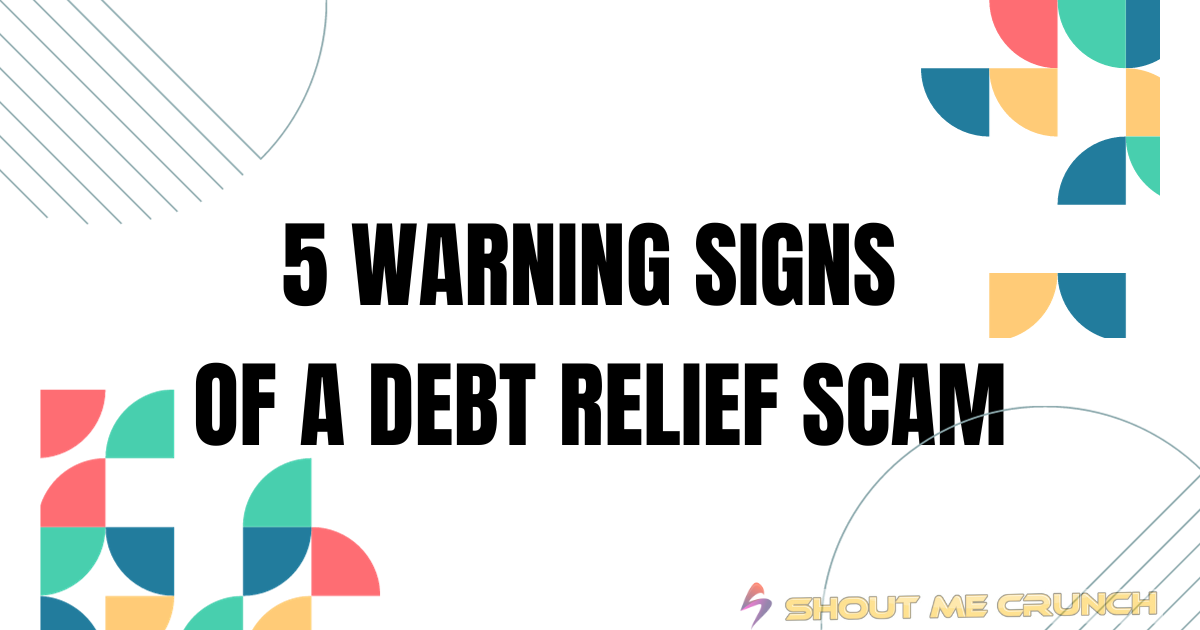The burden of debt can be overwhelming, prompting many individuals to seek professional help to regain their financial footing. Unfortunately, this vulnerability has given rise to an alarming number of debt relief scams, preying on those already facing financial distress. In this article, we’ll shed light on this growing issue and expose the warning signs of illegitimate debt relief services, empowering you to protect your financial well-being.
Debt Relief Safeguard: Beware of Scams
In today’s financially challenging times, the allure of debt relief is strong. Regrettably, there’s a dark side to this industry, with fraudulent debt relief companies taking advantage of those seeking assistance. The result? Countless individuals are left in a worse financial state, having fallen victim to scams that promise relief but deliver only more hardship. But as anyone who’s never sought debt relief services from Accredited before, it’s natural to wonder – is Accredited Debt Relief legit?
Warning Sign 1: Upfront Fees
One of the most critical indicators of a potentially illegitimate debt relief service is its demand for upfront fees. Legitimate debt relief services typically operate on a fee structure that aligns with their results. In other words, they only charge fees after successfully reducing or managing your debt. If a company insists on payment before delivering any services, it’s time to be suspicious.
For example, consider this scenario: A company promises to lower your debt, but first, you must pay a substantial upfront fee. Despite the allure of potential savings, legitimate debt relief services do not require payment until they’ve achieved the results they promised. Scam companies, on the other hand, aim to collect your money upfront and then often disappear or provide no tangible services.

Warning Sign 2: Promises of Guaranteed Results
Debt relief is a complex and individualized process. No legitimate service can guarantee specific results for every client. Be wary of companies that claim they can immediately eliminate your debt or guarantee substantial reductions.
Imagine encountering a company that assures you a 100% reduction in your debt within a month, no matter how much you owe. Such promises are not only unrealistic but also a telltale sign of a scam. Legitimate debt relief services provide estimates and work diligently to negotiate with creditors, but they never promise outcomes that are beyond their control.
Warning Sign 3: Lack of Transparency
Transparency is essential in the world of debt relief. Clients have the right to know precisely what they’re signing up for, including program specifics, fees, and terms. Illegitimate companies thrive on keeping their clients in the dark.
Red flags may include vague program descriptions, hidden terms and conditions, or undisclosed fees. When a company is unwilling to provide detailed information about their services, it’s a clear indication that they may not have your best interests at heart.
Warning Sign 4: No Accreditation or Licensing
Debt reduction firms that are reputable are usually accredited and licensed. Accreditation from reputable organizations like the Better Business Bureau (BBB) and the American Fair Credit Council (AFCC) demonstrates a dedication to industry standards and client safety. Licensing frequently entails adhering to state rules, which assist in guaranteeing that businesses operate responsibly.
Before engaging with any debt relief service, research their credentials. If you find that a company lacks accreditation or licensing, it’s prudent to consider this a significant warning sign. Scam companies often avoid these accreditations because they don’t meet the required standards for ethical business practices.
Warning Sign 5: High-Pressure Sales Tactics
Scam debt relief companies often employ high-pressure sales tactics to rush clients into making decisions. These tactics can include aggressive telemarketing, relentless follow-up calls, or pushing clients into signing contracts without providing sufficient time for consideration.
If you ever feel coerced or pressured into making a quick decision regarding a debt relief service, it’s time to step back. Legitimate companies understand the importance of clients making informed choices and do not resort to high-pressure sales techniques.
Warning Sign 6: Lack of a Clear, Written Agreement
Every legitimate debt relief service should provide you with a clear, written agreement outlining the terms and conditions of the service. This document serves as a legal contract, ensuring that both parties understand their responsibilities.
If a company fails to offer a written agreement or presents one that is convoluted or ambiguous, exercise extreme caution. Scam companies may intentionally create vague agreements to leave room for hidden fees or to evade accountability.

Real-Life Scam Case Studies
To drive home the importance of recognizing and heeding these warning signs, let’s take a look at real-life cases where individuals fell prey to debt relief scams.
Case 1: The Upfront Payment Scam
Jennifer, a single mother who was drowning in credit card debt, received a call from a debt consolidation business. They promised her speedy relief but demanded a $1,000 retainer fee before they could begin working on her case. Jennifer, desperate for assistance, paid the amount, only to discover that the firm had halted communication immediately after receiving the cash. Her money was gone, but her debt was unaffected.
Case 2: The Guaranteed Results Scam
A debt reduction organization approached John, a recent college graduate with student loan debt, and promised to wipe all his debt in three months. He just had to pay a $500 processing charge. John paid the money, excited by the possibility of a debt-free future. Months went by, yet his college loans were still outstanding. The company’s promises fell through, putting John farther in debt.
These cases are just two examples of the countless individuals who have been deceived by fraudulent debt relief services. Their experiences underscore the critical need to recognize warning signs and protect yourself from scams.
How to Protect Yourself from Debt Relief Scams
Protecting yourself from debt relief scams is possible with the right knowledge and precautions. Here are some practical steps to safeguard your financial well-being:
Research Thoroughly: Investigate the debt relief company’s credentials, including accreditation and licensing. Check their Better Business Bureau (BBB) rating and read reviews from previous clients.
Ask Questions: Don’t be afraid to ask detailed questions about the company’s services, fees, and expectations. Legitimate companies are transparent and willing to provide clear answers.
Avoid Upfront Fees: Never pay upfront fees. Legitimate debt relief services charge fees based on their results, not before delivering any services.
Beware of Guaranteed Results: Steer clear of companies that promise guaranteed results. Debt relief is a complex process with no guarantees.
Check for a Written Agreement: Ensure that the company provides a clear, written agreement that outlines all terms and conditions. Review it carefully before signing.
Resist High-Pressure Sales Tactics: Take your time to make an informed decision. If a company pressures you to decide quickly, it’s a red flag.
Seek Legal Advice: Consult with an attorney or a financial advisor to review any agreements and ensure they’re in your best interest.

Reporting Scams and Seeking Legal Recourse
If you believe you’ve fallen victim to a debt relief scam, it’s crucial to take action. Reporting these scams is not only important for your own situation but also for preventing others from experiencing the same fate.
Report to Authorities: Contact your state attorney general’s office, the Federal Trade Commission (FTC), or the Consumer Financial Protection
Legal Recourse: Consult with an attorney to explore legal options for recovering lost funds or seeking compensation for damages. Legal action can hold fraudulent companies accountable.
Educate Others: Share your experience and knowledge with friends and family to prevent them from falling victim to similar scams. Awareness is a powerful tool in the fight against debt relief fraud.
Shout Me Crunch previously published many articles on Difference of Debt Consolidation Loan and Settlement Loan and 5 Mental Changes That Will Help You Get Out Of Debt if you want to compare all these debts, you should read these two articles to know the pros and cons of each and make your decision before taking the leap.
Conclusion
In the quest to find relief from the burden of debt, individuals often turn to debt relief services for help. However, the growing prevalence of debt relief scams necessitates caution and due diligence. By recognizing the warning signs of illegitimate services and taking protective measures, you can safeguard your financial well-being and avoid falling victim to scams.


